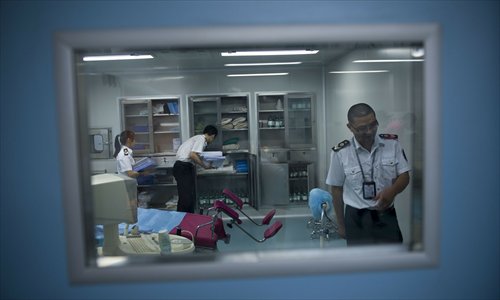Eggs for sale

Health authorities collect evidence at an illegal egg agency in Shenzhen, Guangdong Province in October 2012. Photo: CFP
Business is booming in the Chinese mainland's ovary egg donation black market where agencies advertise their underground services to desperate infertile couples, especially in the cities of Guangzhou and Wuhan.
"Just 120,000 yuan ($19,200) will cover all expenses including surgery, donor, service and hospital," Wuhan-based agent Li Lian told the Global Times reporter posing as a potential buyer.
The payment could be 30,000 to 80,000 yuan based on the resume, Wuhan-based agent Fu Ting told the reporter posing as a potential donor, with accommodation and transport fees to Wuhan all paid.
Buying and selling human eggs is officially illegal on the Chinese mainland, but both agents confirmed all procedures would take place in "regular, professional" hospitals in Wuhan.
"The hospitals usually wink at us egg agents," Fu said. If there were any trouble, Li explained, they could bribe their way out.
Illegal
A 19-year-old Nanjing student suffered ovarian hyperstimulation syndrome, with symptoms of a swollen stomach as if eight months' pregnant, after receiving ovarian stimulation and egg retrieval in a black clinic in exchange for a 20,000 yuan payment from an egg agent, the Modern Express reported on May 20.
"She may have received excessive hormone booster shots," Shi Ruihua, a doctor at Nanjing's Zhongda Hospital affiliated with Southeast University told the Nanjing newspaper.
The report triggered heated discussions about the risks and benefits of the underground egg donation business.
Agents don't say "donors." They refer to egg donors as "volunteers." They call payments "nutrition expenses."
"Laws don't govern this business," Wuhan agent Li said.
The then Ministry of Health officially banned all commercial egg donation and extraction in its 2003 revised regulations on human assisted reproduction technology.
They stipulate that only eggs from women undergoing human-assisted reproduction left over from in vitro fertilization (IVF) treatment can be used.
In other words, egg donors must be women wanting a test tube baby, meaning only their extra eggs can be legally donated to those in need.
Semi-legal
Demand for eggs outstrips supply: Those longing for eggs include women diagnosed with premature ovarian failure, occult ovarian failure or those who cannot provide their own eggs at an advanced maternal age.
Women wait a minimum two to three years for a legal egg, Modern Express quoted an expert with Jiangsu Provincial People's Hospital as saying.
Eggs supplied through this narrow category will always be insufficient to meet demand: About 10 to 15 percent of Chinese couples suffer from infertility problems, with 5 to 6 percent caused by ovarian problems that require egg donations.
Many previous media reports have exposed the black market.
Nandu Daily in 2012 exposed an agency in Shenzhen that bought professional surgical equipment worth more than 10 million yuan.
The agency stood to make between 100,000 and 150,000 yuan profit per deal, while the young women who provided eggs could make 20,000 to 50,000 yuan, the newspaper reported. Authorities shut down the agency in October 2012.
Professional surgeons from licenced hospitals are involved in the business, investigations have revealed.
The Beijing News in 2011 exposed a booming black market in illegal egg brokers and agencies in the capital city: a chain comprising screening, physical examination, egg extraction and surrogate identification.
Agencies target female college students for potential donors and pay up to 30,000 yuan for a Peking University or Tsinghua University donor, the report said.
"Illegal agencies can't be completely torn down solely by regulations as there is a massive market demand that will always breed business," Chen Jianming, a fertility expert and director at a family planning center in the city of Jiangmen, Guangdong Province, told the Global Times.
Legal
Authorities might best control the business by legalizing more types of donations than IVF treatment, Chen suggested.
To expand the pool of eligible donors means establishing an egg bank, Chen said. Establishing an egg bank raises a host of new ethical concerns, meaning comprehensive laws and regulations for management of egg banks must be in place first, to avoid the potential pitfalls.
There are health risks for donors too. About 400 mature eggs are released during a woman's reproductive life, usually one per menstrual cycle.
Improper ovarian stimulation and egg retrieval can cause premature ovarian failure or infertility, Modern Express reported.
The retrieval procedure involves stimulating production with hormones and carries risks for donors that may cause complications such as abdominal bloating and chest pain from ovarian hyperstimulation syndrome.
"Only the most serious cases might result in death," Chen said. Donating eggs is much more complicated than sperm as it involves health risks and using advanced freezing technology for storage, Chen noted.
Sperm banks have already been in place for years in many Chinese cities, and sperm donation has been well accepted by the mainstream society.
To help China's millions of couples struggling with infertility, medical authorities must consider means of providing more legal access to more egg donations, he believed.
Authorities would face more risks and responsibilities setting up egg donation regulations, Chen conceded, but through such measures the nascent black market might wither away and die.
Newspaper headline: Underground business cashes in on infertile couples